
Clancy Street Boys is a 1943 comedy film directed by William Beaudine and starring the East Side Kids. It is Beaudine's first film with the team; he would direct several more in the series and many in the Bowery Boys canon. Leo Gorcey married the female lead Amelita Ward. There is no mention of "Clancy Street" in the film, but a rival gang at Cherry Street appears at the beginning and climax of the film.
The Bowery Boys are fictional New York City characters, portrayed by a company of New York actors, who were the subject of 48 feature films released by Monogram Pictures and its successor Allied Artists Pictures Corporation from 1946 through 1958.

Live Wires is a 1946 film starring the comedy team of The Bowery Boys. It is the first film in the series, which lasted until 1958 and included forty-eight films, after the comedy team of the East Side Kids was revamped and renamed The Bowery Boys.

Mr. Hex is a 1946 American comedy film directed by William Beaudine and starring the comedy team of The Bowery Boys. It is the fifth film in the series.

Hard Boiled Mahoney is a 1947 American comedy film directed by William Beaudine and starring the comedy team of the Bowery Boys along with Teala Loring and Betty Compson. It is the sixth film in the series produced by Monogram Pictures.

News Hounds is a 1947 American comedy film directed by William Beaudine and starring the comedy team of The Bowery Boys. It is the seventh film in the series produced by Monogram Pictures.

Bowery Buckaroos is a 1947 American comedy film directed by William Beaudine and starring the comedy team of The Bowery Boys. It is the eighth film in the series and the last Bowery Boys film that Bobby Jordan appeared in.
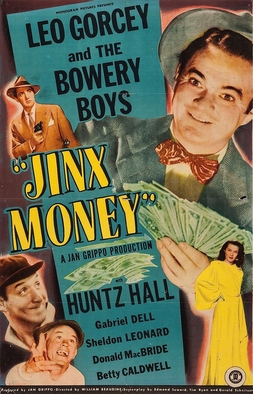
Jinx Money is a 1948 American comedy film directed by William Beaudine and starring the comedy team of The Bowery Boys. It is the tenth film in the series and the first one to include Bennie Bartlett as part of the team.

Blonde Dynamite is a 1950 American comedy film directed by William Beaudine and starring The Bowery Boys. The film was released on February 12, 1950 by Monogram Pictures and is the seventeenth film in the series.
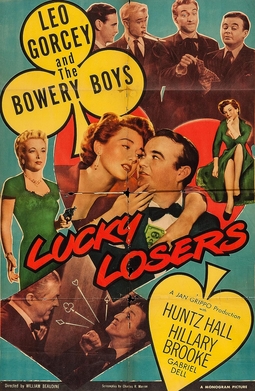
Lucky Losers is a 1950 American comedy film directed by William Beaudine starring The Bowery Boys. The film was released on May 14, 1950, by Monogram Pictures and is the eighteenth film in the series. It had the working title of High Stakes.
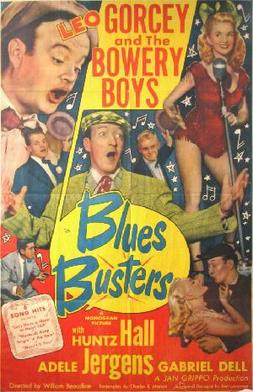
Blues Busters is a 1950 American comedy film directed by William Beaudine and starring The Bowery Boys. The film was released on October 29, 1950 by Monogram Pictures and is the twentieth film in the series.
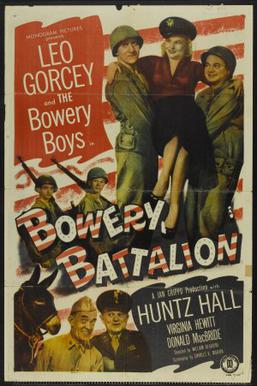
Bowery Battalion is a 1951 comedy film directed by William Beaudine and starring The Bowery Boys. The film was released on January 24, 1951, by Monogram Pictures and is the twenty-first film in the series.
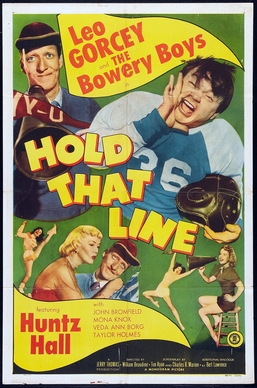
Hold That Line is a 1952 American comedy film directed by William Beaudine and starring the Bowery Boys, Veda Ann Borg and Gloria Winters. The film was released on March 23, 1952 by Monogram Pictures and is the 25th film in the series.
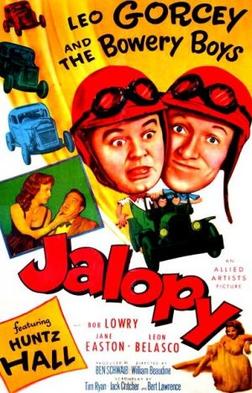
Jalopy is a 1953 comedy film starring The Bowery Boys. The film was released on February 15, 1953 by Allied Artists and is the twenty-ninth film in the series. Jalopy represents the first Bowery Boys film to be released by Allied Artists, previous were by Monogram Pictures.

Paris Playboys is a 1954 American comedy film directed by William Beaudine and starring The Bowery Boys. The film was released on March 7, 1954, by Allied Artists and is the thirty-third film in the series.

In the Money is a 1958 American comedy film directed by William Beaudine and starring The Bowery Boys. The film was released on February 16, 1958, by Allied Artists Pictures and is the 48th and final film in the series. It was directed by William Beaudine and written by Al Martin and Elwood Ullman.
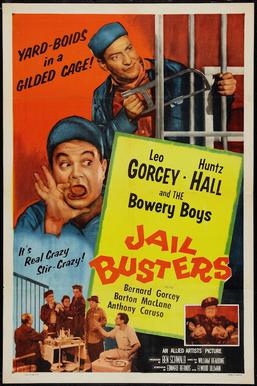
Jail Busters is a 1955 American comedy film starring the comedy team of The Bowery Boys. The film was released on September 18, 1955 by Allied Artists and is the thirty-ninth film in the series.

Spook Chasers is a 1957 horror comedy film starring the comedy team of The Bowery Boys and Robert Shayne. The film was released on June 2, 1957 by Allied Artists and is the forty-fifth film in the series.

Looking for Danger is a 1957 American comedy film directed by Austen Jewell and starring the comedy team of The Bowery Boys. The film was released on October 6, 1957 by Allied Artists and is the forty-sixth film in the series.
The East Side Kids were characters in a series of 22 films released by Monogram Pictures from 1940 through 1945. The series was a low-budget imitation of the Dead End Kids, a successful film franchise of the late 1930s.


















